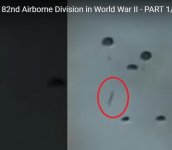As an aside story; while working with the 4th Spl Forces Reserve at the Presidio, SF, CA, in the mid 60s, there was one NCO that related a story that in the early 50s when he joined the army, he told the recruter he was a qualified para. Recruter asked when he went thru jump school. He replied 1936. The recruter said impossible, the army did not have a jump school then. He replied it wasn't a US Army school.
My friend was a German, and a German para. He was on the opposite side and admitted he shot at Americans, and maybe even may have killed them. It was war after all.
He was a good American soldier, and had served, at that time, one tour in VN.
Years later, 79-82, when I served in West Germany, I met one other German national, employed by the USAF, that admitted to fighting against the US and killing an American. All other Gernans I talked to, fought on the Eastern Front. I've always wondered that of that was so, then why did we have such a hard time getting to Berlin.

